Values

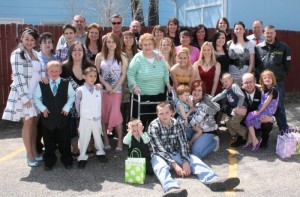 With each passing year, I find myself more and more amazed that my mom, Collene Spencer could be in Heaven for six years now. For those of us who miss her very much, that thought feels sad, but for my mom, who loved the Lord so much and was excited to see Heaven, these have been wonderful years, that seemed like seconds, I’m sure. Each day for her is now spent in rejoicing, because that was always what my mom wanted. She never desired anything more than to worship God and bask in His presence. Like one of the songs we used at her funeral, and those of many others now, tells us, “We can only imagine what it will be like!!”
With each passing year, I find myself more and more amazed that my mom, Collene Spencer could be in Heaven for six years now. For those of us who miss her very much, that thought feels sad, but for my mom, who loved the Lord so much and was excited to see Heaven, these have been wonderful years, that seemed like seconds, I’m sure. Each day for her is now spent in rejoicing, because that was always what my mom wanted. She never desired anything more than to worship God and bask in His presence. Like one of the songs we used at her funeral, and those of many others now, tells us, “We can only imagine what it will be like!!”
Mom enjoyed many things in her lifetime. She liked to travel, go camping, celebrate the holidays, and spend time with family, but more than anything, my mom loved to spend time in the Word. We bought he a Kindle when they first came out, and loaded it with Christian books and the Bible. It made it so much easier for her to read, because it was so light and easy to hold. She had dozens of books at her disposal, and she loved that. She spent her days reading and communing with God while her family was all at work. Anyone who knew her will tell you that my mom was “All about bringing others to the Lord.” She loved people, and didn’t want anyone to be lost, but she really wanted people to know how much God loves them. She never stopped telling others about God’s love for them, and that is to her credit. I can’t begin to count the number of people she led to the Lord in her lifetime.
Of the things on this Earth, the most important to mom was her family. She treasured each and every new baby that was added to her lineage, and I know she can’t wait to meet the ones who have arrived after her homegoing. She also treasured the new spouses and partners. There was a special place in her heart for each of these new additions. When someone loves one of her children, grandchildren, great grandchildren, and beyond, that makes them awesome in Mom’s eyes…and that makes them as much hers as if she had given birth to them. There was always room in Mom’s heart for more loved ones. She loved watching her family grow with each new addition. She considered each one perfect. It s such a wonderful way to look at people, and one 
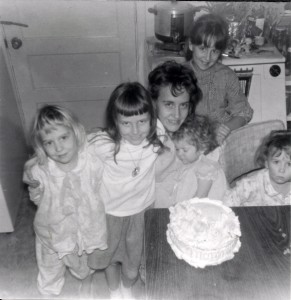 we should all incorporate into our own lives. When I think of the life lessons my mom gave us, these things are among the greatest. As I look forward to my own homegoing someday, I can only imagine just how wonderful it will be, and as I continue my life on Earth, it is my desire to live my life in such a way as to make my mom and my dad proud of the child they raised, and the woman I have become. I miss my mom very much, and I am forever grateful for the life she and my dad gave me. Happy 6th anniversary of your homegoing, Mom. We love and miss you very much and can’t wait to see you again.
we should all incorporate into our own lives. When I think of the life lessons my mom gave us, these things are among the greatest. As I look forward to my own homegoing someday, I can only imagine just how wonderful it will be, and as I continue my life on Earth, it is my desire to live my life in such a way as to make my mom and my dad proud of the child they raised, and the woman I have become. I miss my mom very much, and I am forever grateful for the life she and my dad gave me. Happy 6th anniversary of your homegoing, Mom. We love and miss you very much and can’t wait to see you again.
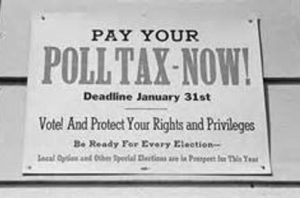 Those of us living today, might not have heard of a thing called a Poll Tax, but it was a very real thing, and with the election process just behind us, I think this might be something worth hearing. The Poll Tax was also known as a head tax or a capitation tax (meaning a tax for a head count). When I first thought about this particular tax, I thought well, maybe that kind of a tax could have ensured a fair election, but really, the opposite is true. While the head tax was considered an important source of revenue for many governments, from ancient times until the 19th century, in the United States at least; voting poll taxes (whose payment was a precondition to voting in an election) have been used to disenfranchise impoverished and minority voters (especially under Reconstruction). I find that absolutely unbelievable. In this nation in most election years, we have to practically beg people to get out and vote. Charging them money for it would all but insure a poor turnout. It would also insure that only those well enough off to be able to “throw money” at an election would be able to vote. Now that is truly appalling.
Those of us living today, might not have heard of a thing called a Poll Tax, but it was a very real thing, and with the election process just behind us, I think this might be something worth hearing. The Poll Tax was also known as a head tax or a capitation tax (meaning a tax for a head count). When I first thought about this particular tax, I thought well, maybe that kind of a tax could have ensured a fair election, but really, the opposite is true. While the head tax was considered an important source of revenue for many governments, from ancient times until the 19th century, in the United States at least; voting poll taxes (whose payment was a precondition to voting in an election) have been used to disenfranchise impoverished and minority voters (especially under Reconstruction). I find that absolutely unbelievable. In this nation in most election years, we have to practically beg people to get out and vote. Charging them money for it would all but insure a poor turnout. It would also insure that only those well enough off to be able to “throw money” at an election would be able to vote. Now that is truly appalling.
It is my understanding that originally the “poll tax” or maybe more correctly, head tax was not about an election, but more like the census. It even has Biblical roots…Mary and Joseph went to Bethlehem to be counted and pay their taxes to Caesar Augustus. This was the first of the head taxes. The tax might have been originally a way to bring in revenue. The poll taxes that followed, in most cases, were purely discriminatory. 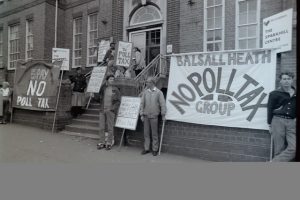 These latter poll taxes ensured that only wealthy people got the chance to cast their vote…thereby putting in candidates that those in charge wanted.
These latter poll taxes ensured that only wealthy people got the chance to cast their vote…thereby putting in candidates that those in charge wanted.
While the Poll Tax might have been a way to bring in money for governments, it seems to me that it could also be a way to make sure that the people vote for the candidate the government wants. Those who might have voted for change to improve the situation in their own neighborhoods, towns, cities, and states, were usually the poorer people, but they couldn’t vote for someone who could help, because they didn’t have the money. Many of these people were minorities. Head taxes were important sources of revenue for many governments from ancient times until the 19th century. In the United Kingdom, poll taxes were levied by the governments of John of Gaunt in the 14th century, Charles II in the 17th and Margaret Thatcher in the 20th century. By their very nature, poll taxes are considered very regressive taxes, are usually very unpopular and have been implicated in many uprisings.
On August 27, 1962, the Twenty-fourth Amendment (Amendment XXIV) of the United States Constitution was proposed. The Twenty-fourth Amendment prohibits both Congress and the states from conditioning the right to vote in federal elections on payment of a poll tax or other types of tax. The amendment was ratified by the states on January 23, 1964. When the 24th Amendment was ratified in 1964, five states still retained a poll tax. Those states were Alabama, Arkansas, Mississippi, Texas, and Virginia. These states continues the practice  even though the amendment prohibited requiring a poll tax for voters in federal elections. Finally, in 1966 the US Supreme Court ruled 6–3 in Harper v. Virginia Board of Elections, that poll taxes for any level of elections were unconstitutional. The ruling stated that the poll tax violated the Equal Protection Clause of the Fourteenth Amendment. Further litigation related to potential discriminatory effects of voter registration requirements has generally been based on application of this clause. Those of us living today, might not have heard of a thing called a Poll Tax, but it was a very real thing, and with the election process just behind us, I think this might be something worth hearing. The Poll Tax was also known as a head tax or a capitation tax (meaning a tax for a head count).
even though the amendment prohibited requiring a poll tax for voters in federal elections. Finally, in 1966 the US Supreme Court ruled 6–3 in Harper v. Virginia Board of Elections, that poll taxes for any level of elections were unconstitutional. The ruling stated that the poll tax violated the Equal Protection Clause of the Fourteenth Amendment. Further litigation related to potential discriminatory effects of voter registration requirements has generally been based on application of this clause. Those of us living today, might not have heard of a thing called a Poll Tax, but it was a very real thing, and with the election process just behind us, I think this might be something worth hearing. The Poll Tax was also known as a head tax or a capitation tax (meaning a tax for a head count).
 As the final day of 2020 arrives, I find myself…relieved. This has been a hard year in so many ways…so many losses. Setting aside the loss of friends and loved ones, because that is almost too much to go into, I will turn my attention instead to the Covid-19 Pandemic, the source of much of the loss we all felt this year. Countless numbers of people lost their jobs this year, or at least temporarily lost their source of income. We became isolated, even if we weren’t sick, we were told to wear masks, and even when things opened up partially, the churches were told to stay closed, while the abortion clinics were considered essential businesses. We were told to shelter in place, making us feel isolated and alone. We couldn’t visit loved ones in nursing homes or hospitals, making them feel alone and forgotten. We were told to skip the holidays and stay at home, further isolating all of us. Urgently needed surgeries and cancer treatments were postponed, because of the virus, but people could still kill the unborn babies. Don’t get me wrong, I do understand the seriousness of the virus, I lost loved ones and friends too, but the way things were handled, especially in Democratically run cities and states, did nothing to protect the
As the final day of 2020 arrives, I find myself…relieved. This has been a hard year in so many ways…so many losses. Setting aside the loss of friends and loved ones, because that is almost too much to go into, I will turn my attention instead to the Covid-19 Pandemic, the source of much of the loss we all felt this year. Countless numbers of people lost their jobs this year, or at least temporarily lost their source of income. We became isolated, even if we weren’t sick, we were told to wear masks, and even when things opened up partially, the churches were told to stay closed, while the abortion clinics were considered essential businesses. We were told to shelter in place, making us feel isolated and alone. We couldn’t visit loved ones in nursing homes or hospitals, making them feel alone and forgotten. We were told to skip the holidays and stay at home, further isolating all of us. Urgently needed surgeries and cancer treatments were postponed, because of the virus, but people could still kill the unborn babies. Don’t get me wrong, I do understand the seriousness of the virus, I lost loved ones and friends too, but the way things were handled, especially in Democratically run cities and states, did nothing to protect the  people of this country. We tried to listen to the scientists, but they kept contradicting themselves and each other. One minute masks saved lives, the next they didn’t. I hate to be a person who only rants, but like most of us, I’m over it…and I’m over 2020.
people of this country. We tried to listen to the scientists, but they kept contradicting themselves and each other. One minute masks saved lives, the next they didn’t. I hate to be a person who only rants, but like most of us, I’m over it…and I’m over 2020.
With all that has gone on in 2020, I am still able to say that I have high hopes for 2021. The craziness and sadness of 2020 will not last forever, because people have a strong tendency to have hope for the future. Pandemics have come and gone, and this one will too. As a nation, we will fight for our freedoms. We have done it before, and we are not scared to do it again. I believe we have God on our side, and in Him, we have the victory in every battle…especially this one. Whether people want the vaccine or not, it gives many people hope that there is an end to this Pandemic. I think that is the main thing that people are looking for these days…hope!!
 As we close out 2020, we can consider it hindsight as we look forward to 202Won!! I really like that, because this nation, as well as many others, need a win right now, and I’m all for putting 2020 in the rearview mirror, and turning the mirror toward the ceiling so we don’t have to look at it ever again. We will persevere, and we will come back stronger, if we don’t lose hope and our strong faith in God!! I am a positive person, but I think 2020 was enough to try anyone’s patience and even faith, but we must never lose faith. Never doubt in the dark, what God told you in the light. And don’t ley what you see make you doubt what God has spoken. So, here’s to the end of 2020. Bring on 202Won!!! Happy New Year everyone.
As we close out 2020, we can consider it hindsight as we look forward to 202Won!! I really like that, because this nation, as well as many others, need a win right now, and I’m all for putting 2020 in the rearview mirror, and turning the mirror toward the ceiling so we don’t have to look at it ever again. We will persevere, and we will come back stronger, if we don’t lose hope and our strong faith in God!! I am a positive person, but I think 2020 was enough to try anyone’s patience and even faith, but we must never lose faith. Never doubt in the dark, what God told you in the light. And don’t ley what you see make you doubt what God has spoken. So, here’s to the end of 2020. Bring on 202Won!!! Happy New Year everyone.
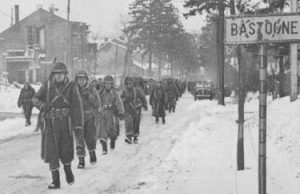
 The Battle of the Bulge has been a brutal, hard-fought battle. The soldiers were tired, cold, and hungry; and all they wanted was a night off to recharge. That was not to be. They had more pressing matters to attend to, and the fate of the free world might just depend on their success. The Germans had achieved a total surprise attack on the Belgian town of Bastogne, on the morning of December 16, 1944, due to a combination of Allied overconfidence, preoccupation with Allied offensive plans, and poor aerial reconnaissance because to bad weather. The American forces, specifically the US 101st Airborne Division bore the brunt of the attack and incurred their highest casualties of any operation during the war. The town was vital to the Germans, because it would open up a valuable pathway further north for German expansion. The siege had to be stopped, and the 101st Airborne Division needed help to do it.
The Battle of the Bulge has been a brutal, hard-fought battle. The soldiers were tired, cold, and hungry; and all they wanted was a night off to recharge. That was not to be. They had more pressing matters to attend to, and the fate of the free world might just depend on their success. The Germans had achieved a total surprise attack on the Belgian town of Bastogne, on the morning of December 16, 1944, due to a combination of Allied overconfidence, preoccupation with Allied offensive plans, and poor aerial reconnaissance because to bad weather. The American forces, specifically the US 101st Airborne Division bore the brunt of the attack and incurred their highest casualties of any operation during the war. The town was vital to the Germans, because it would open up a valuable pathway further north for German expansion. The siege had to be stopped, and the 101st Airborne Division needed help to do it.
The capture of Bastogne was the ultimate goal of the Battle of the Bulge…the German offensive through the Ardennes forest. Bastogne provided a road junction in rough terrain where few roads existed. The Belgian town was defended by the US 101st Airborne Division, which had to be reinforced by troops who straggled in from other battlefields. Food, medical supplies, and other resources eroded as bad weather and relentless German assaults threatened the Americans’ ability to hold out. Nevertheless, Brigadier General Anthony C MacAuliffe met a German surrender demand with a typewritten response of a single word, “Nuts.”
This was as bad as it gets, and they needed a hero. Enter “Old Blood and Guts” Patton. General George S Patton Jr was a “street fighter” of a general. He knew what it took to win, and he refused to lose. He was the kind of leader any army, and indeed any government needed. Patton made the decision, the only possible decision he could make. The plan was a “complex and quick-witted strategy wherein he literally wheeled his 3rd Army a sharp 90° turn in a counterthrust movement.” It sounds like a simple plan, but there is no more risk-laden battlefield maneuver than a 90° turn and then a move across and perpendicular to their own lines of communication. The possibilities of mistakes being make were endless. Still, Patton told his men that lives depended on them, and they needed to be in Bastogne…100 miles away, in five days. Not only that, but the march would be over a mountain pass in frigid temperatures. It seemed an impossible 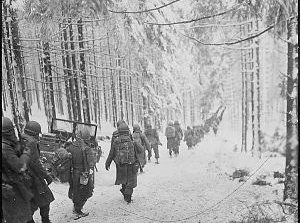
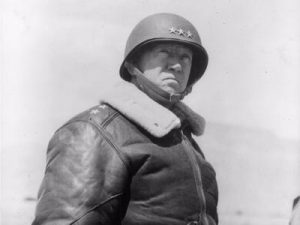 task, but two days later, Patton broke through the German lines and entered Bastogne, relieving the valiant defenders and ultimately pushing the Germans east across the Rhine. I think that if this mission had been asked of any other general, the results might not have been so great. There are generals in war who may annoy everyone around them, but when it comes to doing what is best for the people in trouble, you don’t want anyone else to do the job.
task, but two days later, Patton broke through the German lines and entered Bastogne, relieving the valiant defenders and ultimately pushing the Germans east across the Rhine. I think that if this mission had been asked of any other general, the results might not have been so great. There are generals in war who may annoy everyone around them, but when it comes to doing what is best for the people in trouble, you don’t want anyone else to do the job.
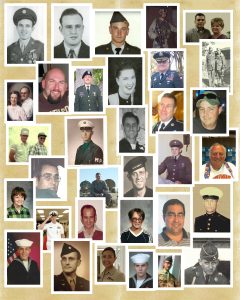 The United States is a great nation, but it would be very hard for a nation to remain great, if that nation did not have a strong military. These days, national security is not guaranteed. That makes our military men and women absolutely essential. All too often, I don’t think we give our veterans the respect and recognition they deserve.
The United States is a great nation, but it would be very hard for a nation to remain great, if that nation did not have a strong military. These days, national security is not guaranteed. That makes our military men and women absolutely essential. All too often, I don’t think we give our veterans the respect and recognition they deserve.
Veterans and soldiers are unique characters. Most of us are not interested in running off to some other country at the drop of a hat to defend people we don’t even know. Nevertheless, when a people are being oppressed, it is a soldier who is called to defend them. These soldiers leave their homes and families, often for months at a time, and go off to another country to defend strangers. They miss births, first steps, school plays, graduations, and so much more. They miss tucking their children in at night, 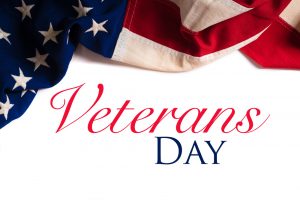 dropping them off at school in the morning, watching their sporting events, and having weekend barbecues, just to name a few. By the time they have left the military, their children are often mostly grown up. It is time they can never get back, and yet they consider it time well spent, because they did their duty and they saved lives. What more could we ask of them?
dropping them off at school in the morning, watching their sporting events, and having weekend barbecues, just to name a few. By the time they have left the military, their children are often mostly grown up. It is time they can never get back, and yet they consider it time well spent, because they did their duty and they saved lives. What more could we ask of them?
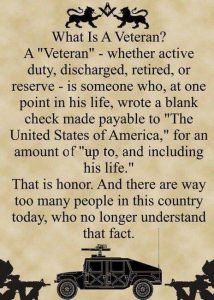 Veterans Day is a day when we honor those who served and upon their discharge, came back home. In this case, while it does honor veterans who have gone to their Heavenly home, it is not about those killed in action. Theirs is a different day…Memorial Day, the day we remember those lost in battle. All of these men and women served their country and the world, but a veteran came home and lived out their life…hopefully with all their limbs attached, but many times that was not to be either. Those veterans, and those with PTSD need our help badly, but all veterans, no matter what the outcome of their service was, deserve our complete and total respect. Veterans Day began on November 11, 1919, making this year the 101st anniversary of that date. To all those among us who served, thank you for your service, and to those veterans who have gone home, including my dad, Allen Spencer and many family members, I thank you!! Happy Veterans Day.
Veterans Day is a day when we honor those who served and upon their discharge, came back home. In this case, while it does honor veterans who have gone to their Heavenly home, it is not about those killed in action. Theirs is a different day…Memorial Day, the day we remember those lost in battle. All of these men and women served their country and the world, but a veteran came home and lived out their life…hopefully with all their limbs attached, but many times that was not to be either. Those veterans, and those with PTSD need our help badly, but all veterans, no matter what the outcome of their service was, deserve our complete and total respect. Veterans Day began on November 11, 1919, making this year the 101st anniversary of that date. To all those among us who served, thank you for your service, and to those veterans who have gone home, including my dad, Allen Spencer and many family members, I thank you!! Happy Veterans Day.
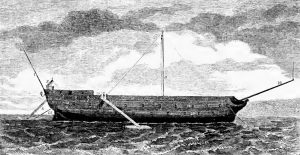 I am sometimes amazed at the ability of humans to be heinously cruel to other human beings. From murders, to slave owners, to prisons or prisoner of war camps, man has the ability to act out evil in its purest form. Still, one would not have expected such evil in the American Revolutionary War era. Well, one would be wrong. We all know that war is a horrific event, but worse than losing life and limb in battle, seems to be the fate faced by those who are captured by the enemy forces, only to be tortured and even killed.
I am sometimes amazed at the ability of humans to be heinously cruel to other human beings. From murders, to slave owners, to prisons or prisoner of war camps, man has the ability to act out evil in its purest form. Still, one would not have expected such evil in the American Revolutionary War era. Well, one would be wrong. We all know that war is a horrific event, but worse than losing life and limb in battle, seems to be the fate faced by those who are captured by the enemy forces, only to be tortured and even killed.
During the Revolutionary War, being captured by the British often meant being sent to a prison ship, the worse of which was the HMS Jersey. Over the years of the war, approximately 11,000 prisoners of war perished on the HMS Jersey. The number of American field casualties during that war was approximately 4,500. That is a stunning difference. The HMS Jersey often held thousands of prisoners at one time, in quarters that were so close, that it could be likened to being packed in like sardines in a tin. There was no light, no medical care, barely any oxygen, and very little in the way of food and clean water. The guards on the prison ships were not concerned with keeping their prisoners alive, and HMS Jersey was the worst of them all.
The little food the prisoners were given was moldy, putrefied, and worm infested. The prisoners had to choose daily to eat the horrible food, or starve. One prisoner Ebenezer Fox, who survived said, “The bread was mostly mouldy, and filled with worms. It required considerable rapping upon the deck, before these worms could be dislodged from their lurking places in a biscuit. As for the pork, we were cheated out of it more than half the time, and when it was obtained one would have judged from its motley hues, exhibiting the consistence and appearance of variegated soap, that it was the flesh of the porpoise or sea hog, and had been an inhabitant of the ocean, rather than a sty. The provisions were generally damaged, and from the imperfect manner in which they were cooked were about as indigestible as grape shot.” That pretty much says it all, I would say. The British soldiers were seemingly unaffected by the image of prisoners banging their biscuits against the deck to remove worms, because this treatment continued throughout the conflict.
Because the prisoners were kept at sea, the smell of a piece of dirt from the shoes of a soldier back from shore leave became one of the prisoners’ greatest delights. I guess that one can always find some good, even in the worst situations, if one looks for it. Captain Dring, a survivor who wrote prolifically about his experiences on the Jersey, recalled one particularly strange consolation. When someone died on the ship, their remains were usually thrown overboard, but occasionally they were allowed to be taken ashore and laid to rest. Dring was part of a group that was tasked with digging graves on land. The men chosen for this duty were ecstatic to be on land again. Dring even took off his boots simply to feel the earth underneath his feet. However, when the crew came across a piece of broken-up turf, they did something extraordinary: “We went by a small patch of turf, some pieces of which we tore up from the earth, and obtained permission to carry them on board for our comrades to smell them. Circumstances like these may appear trifling to the careless reader; but let him be assured that they were far from being trifles to men situated as we had been. Sadly did we approach and reenter our foul and disgusting place of confinement. The pieces of turf which we carried on board were sought for by our fellow prisoners, with the greatest avidity, every fragment being passed by them from hand to hand, and its smell inhaled as if it had been a fragrant rose.”
The known fate of the men on board the prison ships, and especially HMS Jersey was a slow and painful death. Most knew better than to expect to survive their ordeal. They had seen too many of their comrades die right before their eyes, to have much hope that they could make it out. To make mattes worse, the majority of the prisoners aboard the Jersey were young, inexperienced farmhands, not hardened soldiers with survival experience. Only a few of Washington’s army were soldiers with any 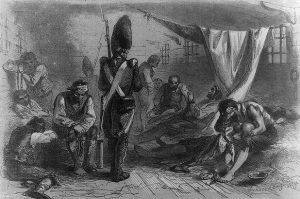 experience. The rest were provincial people, and many had never traveled beyond the limits of the small county where they lived. Imagine the horror of war, and then the conditions on HMS Jersey to the young, innocent men. The constant punishment, meager rations, lack of light, and lack of privacy could be tolerated, but the inactivity and helplessness most likely added depression and despair to their suffering. Times were different then, and there were things that were not available, but many of the things the prisoners suffered could have been avoided, especially the overcrowding and unsanitary conditions, but apparently they just didn’t care.
experience. The rest were provincial people, and many had never traveled beyond the limits of the small county where they lived. Imagine the horror of war, and then the conditions on HMS Jersey to the young, innocent men. The constant punishment, meager rations, lack of light, and lack of privacy could be tolerated, but the inactivity and helplessness most likely added depression and despair to their suffering. Times were different then, and there were things that were not available, but many of the things the prisoners suffered could have been avoided, especially the overcrowding and unsanitary conditions, but apparently they just didn’t care.
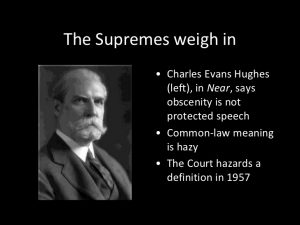 I sometimes think that I am from a different era…one where people didn’t use so many obscenities. In reality, I am from that era, because on June 24, 1957, when I was just a 14 months old, the United States Supreme Court ruled that obscenity is not protected by the First Amendment to the Constitution, which guarantees free speech and freedom of the press. Call me old fashioned, but when I hear someone screaming at their own child, using every obscenity known to man, it makes me cringe. Calling our children such horrible names, can’t possibly be a good way to teach them self esteem. The United States Supreme Court agreed, according to Roth v. United States, a case decided in 1957. Samuel Roth of New York City was convicted of mailing obscene materials. On appeal his conviction was affirmed by the Supreme Court, which held that obscenity was not protected by the First Amendment to the United States Constitution. The court ruled that “material is obscene if, to the average person applying contemporary community standards, the dominant overall theme appeals to prurient interest.”
I sometimes think that I am from a different era…one where people didn’t use so many obscenities. In reality, I am from that era, because on June 24, 1957, when I was just a 14 months old, the United States Supreme Court ruled that obscenity is not protected by the First Amendment to the Constitution, which guarantees free speech and freedom of the press. Call me old fashioned, but when I hear someone screaming at their own child, using every obscenity known to man, it makes me cringe. Calling our children such horrible names, can’t possibly be a good way to teach them self esteem. The United States Supreme Court agreed, according to Roth v. United States, a case decided in 1957. Samuel Roth of New York City was convicted of mailing obscene materials. On appeal his conviction was affirmed by the Supreme Court, which held that obscenity was not protected by the First Amendment to the United States Constitution. The court ruled that “material is obscene if, to the average person applying contemporary community standards, the dominant overall theme appeals to prurient interest.”
These days, we are bombarded with obscenities and profanities…everything from the f-bomb to the names we 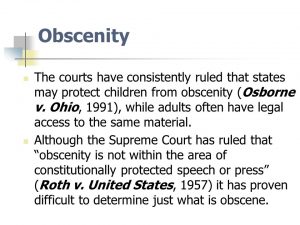 call people we don’t particularly like. Television shows use obscenities on just about every show, and our children are growing up to think that not only is it ok to call people such names, but its ok to be constantly angry…and to let everyone around you know it. It seems to me that as all the obscenities became commonplace, so did anger. And anger breeds hate, which in turn breeds things like road rage, bullying, and even murder.
call people we don’t particularly like. Television shows use obscenities on just about every show, and our children are growing up to think that not only is it ok to call people such names, but its ok to be constantly angry…and to let everyone around you know it. It seems to me that as all the obscenities became commonplace, so did anger. And anger breeds hate, which in turn breeds things like road rage, bullying, and even murder.
Now, that we have the freedom to say the things that we do, another problem has come to light…hate speech. What is hate speech? It never used to be a thing, although it did exist…it just didn’t have a name, per se. So we have somehow come full circle, to a degree. While the Supreme Court used to say that we can’t use obscenities or profanities, and then suddenly we could, now we find ourselves with the necessity to decide if something said is “hate speech” or not, and if it is, then has the right to free speech been denied. Why is one thing different than the other? Believe me, I don’t like either kind of talk…hate or obscene, but if one is “illegal” then shouldn’t the other also be “illegal.” Or, should we have any say at all? It is a vicious circle to be sure. I guess that in reality, it is a moral issue. We have slipped so far from the moral values of our ancestors that our 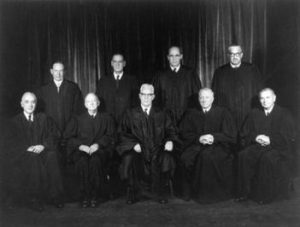 world almost doesn’t even resemble that of the era I was raised in, and certainly bears no resemblance to the era of our ancestors. While I can’t say exactly how to solve this dilemma, I think that maybe the best solution lies within each of us. Maybe we need to walk away from the situations that make us angry. Maybe we need to be more careful of the speech and behaviors that we show to our children. Maybe we need to teach our children that other people have a right to their opinion too, and it is not up to us to be their verbal police. Maybe we need to take offense less, and show compassion more. No matter what the ultimate solution is, there is no doubt in my mind that it begins in the human heart.
world almost doesn’t even resemble that of the era I was raised in, and certainly bears no resemblance to the era of our ancestors. While I can’t say exactly how to solve this dilemma, I think that maybe the best solution lies within each of us. Maybe we need to walk away from the situations that make us angry. Maybe we need to be more careful of the speech and behaviors that we show to our children. Maybe we need to teach our children that other people have a right to their opinion too, and it is not up to us to be their verbal police. Maybe we need to take offense less, and show compassion more. No matter what the ultimate solution is, there is no doubt in my mind that it begins in the human heart.

 My grand nephew, Xander Spethman like most kids this year, had a challenging school year. He had never planned to be homeschooled. He was used to having his friends around him and all the activities at school. He was used to some level of independence that going to high school offered. Then, suddenly he was at home with his siblings. His parents were often at work, so that also left Xander in charge sometimes. In many kids Xander’s age, that many hours with the younger siblings might have made life miserable for all concerned, but Xander is a kind-hearted young man. He loves his siblings, and they look up to him. Xander tried to be a lead-by-example kind of person. That makes for a much more harmonious household, whether the parents are there or not.
My grand nephew, Xander Spethman like most kids this year, had a challenging school year. He had never planned to be homeschooled. He was used to having his friends around him and all the activities at school. He was used to some level of independence that going to high school offered. Then, suddenly he was at home with his siblings. His parents were often at work, so that also left Xander in charge sometimes. In many kids Xander’s age, that many hours with the younger siblings might have made life miserable for all concerned, but Xander is a kind-hearted young man. He loves his siblings, and they look up to him. Xander tried to be a lead-by-example kind of person. That makes for a much more harmonious household, whether the parents are there or not.
Xander and his brother, Zack have become best friends. They share a love of long boarding, and now they go  as often as they can. He is also sweet to his other siblings, Isaac, and little Aleesia, who thinks her brothers “hung the moon,” a fact that is obvious by the way she looks at them. Xander is a very loyal person. He is also protective of his family. He is an amazing big brother, who always takes time to help with whatever his little brothers and sister need. Xander has demonstrated many leader qualities, that have been beneficial to his siblings and his friends alike. Xander’s mom, Jenny attributes those attributes to being the oldest child, but I disagree. Being the oldest doesn’t guarantee leadership. Those leadership qualities come from several sources, not the least of which is good parental upbringing. It also comes from something inside a person that says, “This is the right thing to do, and that is not.” It is about being settled in the right things to do, and it’s having a determination to do what is right, even if it is the harder road. Xander has that determination, and his family has become the beneficiary of those good leadership qualities. They are very proud of him.
as often as they can. He is also sweet to his other siblings, Isaac, and little Aleesia, who thinks her brothers “hung the moon,” a fact that is obvious by the way she looks at them. Xander is a very loyal person. He is also protective of his family. He is an amazing big brother, who always takes time to help with whatever his little brothers and sister need. Xander has demonstrated many leader qualities, that have been beneficial to his siblings and his friends alike. Xander’s mom, Jenny attributes those attributes to being the oldest child, but I disagree. Being the oldest doesn’t guarantee leadership. Those leadership qualities come from several sources, not the least of which is good parental upbringing. It also comes from something inside a person that says, “This is the right thing to do, and that is not.” It is about being settled in the right things to do, and it’s having a determination to do what is right, even if it is the harder road. Xander has that determination, and his family has become the beneficiary of those good leadership qualities. They are very proud of him.
Xander is a very good example not only to his family, but also to his friends. The leadership qualities Xander 
 displays to his friends, cause many of them to seek him out when they need advise. Unlike many situations where kids are advising kids, which can be catastrophic in their misguided advise, Xander is a very good counselor to his friends. He has a strong sense of right and wrong, and doesn’t like it when he sees anyone being mistreated…a very important quality in a time when “bullying” has become the norm in schools. He always helps anyone who asks and tries to look out for everyone. That is the kind of friend, and brother, everyone is proud to know. Today is Xander’s 17th birthday. Happy birthday Xander!! Have a great day!! We love you!!
displays to his friends, cause many of them to seek him out when they need advise. Unlike many situations where kids are advising kids, which can be catastrophic in their misguided advise, Xander is a very good counselor to his friends. He has a strong sense of right and wrong, and doesn’t like it when he sees anyone being mistreated…a very important quality in a time when “bullying” has become the norm in schools. He always helps anyone who asks and tries to look out for everyone. That is the kind of friend, and brother, everyone is proud to know. Today is Xander’s 17th birthday. Happy birthday Xander!! Have a great day!! We love you!!

 With each new story of disaster, pandemic, or even murderous scare tactics, the news media splashes the newspaper, internet, and television with sensationalistic stories of doom and gloom. Yes, these things are serious matters, but sometimes I wonder if the news media are the only ones who are doing well throughout the crisis. It’s not that the news media doesn’t have a job to do so that the people are well informed, but even the doctors are saying that they have far overdone the current news stories. The news media has led people to believe that this is going to get so bad that entire cities are going to be quarantined for extended periods of time. The news reports are so bad, that it has prompted people to run out and buy up every necessity to the point of shortages. Things like toilet paper, hand sanitizer, face masks, disinfecting wipes, and rubbing alcohol are in seriously short supply. People are buying far more than they could possibly us in more than a year. There have even been people who won’t drink Carona beer, because of the similarity to the name of the virus. The insanity is astounding!!
With each new story of disaster, pandemic, or even murderous scare tactics, the news media splashes the newspaper, internet, and television with sensationalistic stories of doom and gloom. Yes, these things are serious matters, but sometimes I wonder if the news media are the only ones who are doing well throughout the crisis. It’s not that the news media doesn’t have a job to do so that the people are well informed, but even the doctors are saying that they have far overdone the current news stories. The news media has led people to believe that this is going to get so bad that entire cities are going to be quarantined for extended periods of time. The news reports are so bad, that it has prompted people to run out and buy up every necessity to the point of shortages. Things like toilet paper, hand sanitizer, face masks, disinfecting wipes, and rubbing alcohol are in seriously short supply. People are buying far more than they could possibly us in more than a year. There have even been people who won’t drink Carona beer, because of the similarity to the name of the virus. The insanity is astounding!!
I’m not saying that people don’t need to know about the situation, but when you turn on the news and all you hear is the fear mongering of the news media. The drama seekers need to set aside the need to “make their entire career” with the latest crisis, and instead give the information needed, in a clear non-dramatic manner so people have the ability to make sensible decisions about their own health. The way the latest media-managed crisis is being handled is like yelling “fire” in a packed event center. Yes, you’ll clear the place out, but lives will be lost in the process.
For some time now, the news media has been throwing out so much fake news that people no longer believe the news media. That is a dangerous place to be, because, like the boy who cried “wolf,” after a while nobody is listening anymore. They already know that the news media is just sensationalizing the story, so it’s probably all a lie anyway. If there ever is a serious crisis, it will arrive before anyone can prepare, because the screaming of the news media into the wind, is no longer being heard. It’s time for the news media to get back to the 
 “honorable,” “fair and balanced,” “we report, you decide” way of reporting again, so they can begin to rebuild the people’s trust, which they lost long ago. Since the news media can’t stop the sensationalism, it’s time for the people to use common sense, and show that we are wiser than the news media. There are so many ways to protect ourselves, without mass hysteria.
“honorable,” “fair and balanced,” “we report, you decide” way of reporting again, so they can begin to rebuild the people’s trust, which they lost long ago. Since the news media can’t stop the sensationalism, it’s time for the people to use common sense, and show that we are wiser than the news media. There are so many ways to protect ourselves, without mass hysteria.
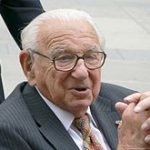 His name was Sir Nicholas George Winton MBE, but in his early years, he had not been bestowed with such an honor as knighthood. That came about much later in his life. Sir Winton was born on May 19, 1909 in Hampstead, London, England. He was a British humanitarian, born to German-Jewish parents, Rudolph Wertheim (1881–1937), a bank manager, and his wife Barbara (née Wertheimer, 1888–1978) who had emigrated to Britain. His parents had moved to London two years before he was born. The family name was Wertheim, but they changed it to Winton in an effort at integration. They also converted to Christianity, and Winton was baptized. God had a plan for Sir Winton’s life, although he would not know that for years.
His name was Sir Nicholas George Winton MBE, but in his early years, he had not been bestowed with such an honor as knighthood. That came about much later in his life. Sir Winton was born on May 19, 1909 in Hampstead, London, England. He was a British humanitarian, born to German-Jewish parents, Rudolph Wertheim (1881–1937), a bank manager, and his wife Barbara (née Wertheimer, 1888–1978) who had emigrated to Britain. His parents had moved to London two years before he was born. The family name was Wertheim, but they changed it to Winton in an effort at integration. They also converted to Christianity, and Winton was baptized. God had a plan for Sir Winton’s life, although he would not know that for years.
On the eve of World War II, Sir Winton knew what his calling had been, and he quietly set about orchestrating the rescue of 669 children, most of them Jewish, from Czechoslovakia. Sir Winton quickly found homes for the children and arranged for their safe passage to Britain. The operation was known as the Czech Kindertransport, which is German for “children’s transport, but it would not be called that right away. The transport was not a official operation, and was not sanctioned as such. He worked largely alone to set this up, and most people knew nothing about it for over 50 years, but the children did not forget the man they called the British Schindler, who had saved their lives.
Then, in 1988, he was invited to the BBC television program “That’s Life!.” It was a surprise party of sorts. Little 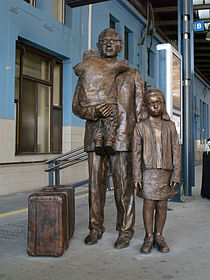 did Sir Winton know, but his secret was no longer such a secret. Arriving at the show, Sir Winton was seated in a room full of people he did not know. Soon, the truth was told to him, and he found out that the “audience” was in fact a number of the children he had rescued all those years ago. The grateful children, now grown adults, wanted to reunite with the man who had saved then all those years ago. It was the British press who celebrated him and dubbed him the “British Schindler.” Sir Winton was brought to tears, as he looked around him at all of these people who owed him their very lives, but his story did not end there. In 2003, Nicholas Winton became Sir Nicholas George Winton MBE (Most Excellent Order of the British Empire), when he was knighted by Queen Elizabeth II for “services to humanity, in saving Jewish children from Nazi Germany occupied Czechoslovakia.” Then, on October 28, 2014, he was awarded the highest honor of the Czech Republic, the Order of the White Lion (1st class), by Czech President Miloš Zeman. The little German-Jewish boy, whose family converted to Christianity, and who always felt a love for humanity and those in need, had become a great man indeed. God did have a plan for his life, and Sir Winton had made God proud. Sir Nicholas George Winton MBE passed away peacefully in his sleep on July 1, 2015, at Wexham Park Hospital, Slough, Berkshire, England, at the age of 106 years, having lived a full life. After the war, Winton worked for the International Refugee Organization and then the International Bank for Reconstruction and Development in Paris, where he met Grete Gjelstrup, a Danish secretary and accountant’s daughter. They married in her hometown of Vejle on October 31, 1948. The couple settled in Maidenhead, England, where they raised their three children: Nick (born 1951), Barbara (born 1954) and the youngest Robin (1956–1962), who was born
did Sir Winton know, but his secret was no longer such a secret. Arriving at the show, Sir Winton was seated in a room full of people he did not know. Soon, the truth was told to him, and he found out that the “audience” was in fact a number of the children he had rescued all those years ago. The grateful children, now grown adults, wanted to reunite with the man who had saved then all those years ago. It was the British press who celebrated him and dubbed him the “British Schindler.” Sir Winton was brought to tears, as he looked around him at all of these people who owed him their very lives, but his story did not end there. In 2003, Nicholas Winton became Sir Nicholas George Winton MBE (Most Excellent Order of the British Empire), when he was knighted by Queen Elizabeth II for “services to humanity, in saving Jewish children from Nazi Germany occupied Czechoslovakia.” Then, on October 28, 2014, he was awarded the highest honor of the Czech Republic, the Order of the White Lion (1st class), by Czech President Miloš Zeman. The little German-Jewish boy, whose family converted to Christianity, and who always felt a love for humanity and those in need, had become a great man indeed. God did have a plan for his life, and Sir Winton had made God proud. Sir Nicholas George Winton MBE passed away peacefully in his sleep on July 1, 2015, at Wexham Park Hospital, Slough, Berkshire, England, at the age of 106 years, having lived a full life. After the war, Winton worked for the International Refugee Organization and then the International Bank for Reconstruction and Development in Paris, where he met Grete Gjelstrup, a Danish secretary and accountant’s daughter. They married in her hometown of Vejle on October 31, 1948. The couple settled in Maidenhead, England, where they raised their three children: Nick (born 1951), Barbara (born 1954) and the youngest Robin (1956–1962), who was born  with Down syndrome. At the family’s insisted Robin stayed with them, rather than being sent to a residential home. Sir Winton’s son, Robin died of meningitis, the day before his sixth birthday. The death was devastating for Winton and he founded a local support organization that later became Maidenhead Mencap. Winton stood, unsuccessfully, for the town council in 1954, but later found work in the finance departments of various companies. His wife, Grete preceded him in death in 1999. Sir Nicholas George Winton MBE was a truly remarkable man.
with Down syndrome. At the family’s insisted Robin stayed with them, rather than being sent to a residential home. Sir Winton’s son, Robin died of meningitis, the day before his sixth birthday. The death was devastating for Winton and he founded a local support organization that later became Maidenhead Mencap. Winton stood, unsuccessfully, for the town council in 1954, but later found work in the finance departments of various companies. His wife, Grete preceded him in death in 1999. Sir Nicholas George Winton MBE was a truly remarkable man.

